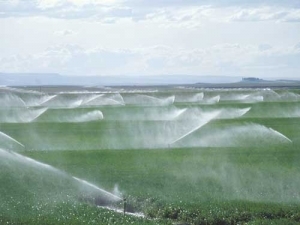Australian teams to help repair North Canterbury irrigators after storm
Moves are afoot to get a team of Australians over here to help repair North Canterbury's irrigation machinery, ravaged by the big windstorm of late October.
 Irrigation New Zealand welcomes the Government's 'Next steps for fresh water' consultation document but encourages the Government to 'get on with it.'
Irrigation New Zealand welcomes the Government's 'Next steps for fresh water' consultation document but encourages the Government to 'get on with it.'
Irrigation New Zealand welcomes the Government's 'Next steps for fresh water' consultation document but encourages the Government to 'get on with it.'
CEO Andrew Curtis says Irrigation NZ was hoping for more immediate action from central government, particularly around water infrastructure and transfer.
"In the third and fourth reports the benefits of water infrastructure and transfer are clearly recognised, and the immediate need is backed up by recent South Island droughts," he says.
"Freshwater is a natural and recurring resource we need to protect. It needs to be properly and carefully managed to bolster our agricultural-led economy."
Irrigation NZ changes to the water transfer system that allow for more dynamic use of the allocable volume are a key.
Also, for the development of modern multi-purpose infrastructure, the initial regional scoping stage needs to be viewed as a public good - allowing communities to objectively work through their options.
"There's a number of economic growth studies being undertaken in the regions, including Northland, Bay of Plenty and the Manawatu," says Curtis
"All identify the potential of water, but a lack of resourcing results in the subsequent regional scoping stage being stalled or under-done.
"If we're serious about economic development in the provinces this scoping phase needs greater resourcing and in a timely manner. Once a potential project is identified this is when the public-private approach should kick in."
Curtis says there were a number of positives in the document: "Stock exclusion regulations are long overdue – they provide an easy fix for a number of water quality issues in New Zealand.
"Broadening the scope of the $100 million Freshwater Improvement Fund to include environmental infrastructure makes sense as win-win environmental-economic solutions are key to a sustainable future for all New Zealanders.
"The focus upon implementation of Good Management Practice and clearly defining technical efficiency expectations is also welcome. The future needs to be about ever improving practices and actions on the ground, that's how you create outcomes.
"Irrigation New Zealand has spent the past 10 years developing minimum expectations for irrigation performance, these are written into a series of industry codes of practice and standards that are supported by knowledge resources and training.
"In the past three years, over 1000 irrigators have attended irrigation management training days.
"There's a number of examples of how both irrigators and irrigation schemes are achieving SMART Irrigation – Good Management Practice – on the SMART Irrigation website: http://smartirrigation.co.nz/
Former Agriculture Minister and Otaki farmer Nathan Guy has been appointed New Zealand’s Special Agricultural Trade Envoy (SATE).
Alliance Group has commissioned a new heat pump system at its Mataura processing plant in Southland.
Fonterra has slashed another 50c off its milk price forecast as global milk flows shows no sign of easing.
Meat processors are hopeful that the additional 15% tariff on lamb exports to the US will also come off.
Fears of a serious early drought in Hawke’s Bay have been allayed – for the moment at least.
There was much theatre in the Beehive before the Government's new Resource Management Act (RMA) reform bills were introduced into Parliament last week.

OPINION: The release of the Natural Environment Bill and Planning Bill to replace the Resource Management Act is a red-letter day…
OPINION: Federated Farmers has launched a new campaign, swapping ‘The Twelve Days of Christmas’ for ‘The Twelve Pests of Christmas’ to…